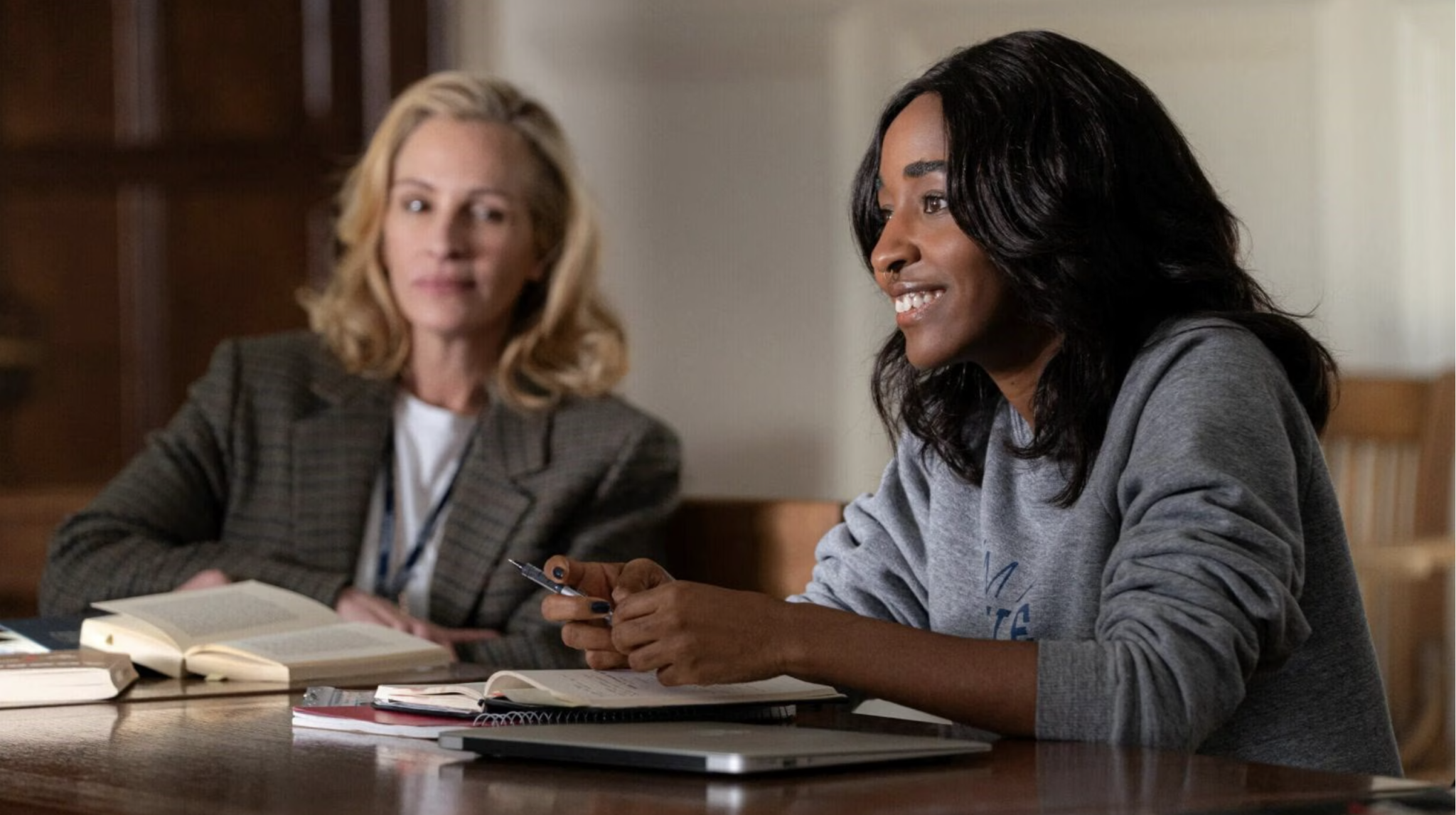
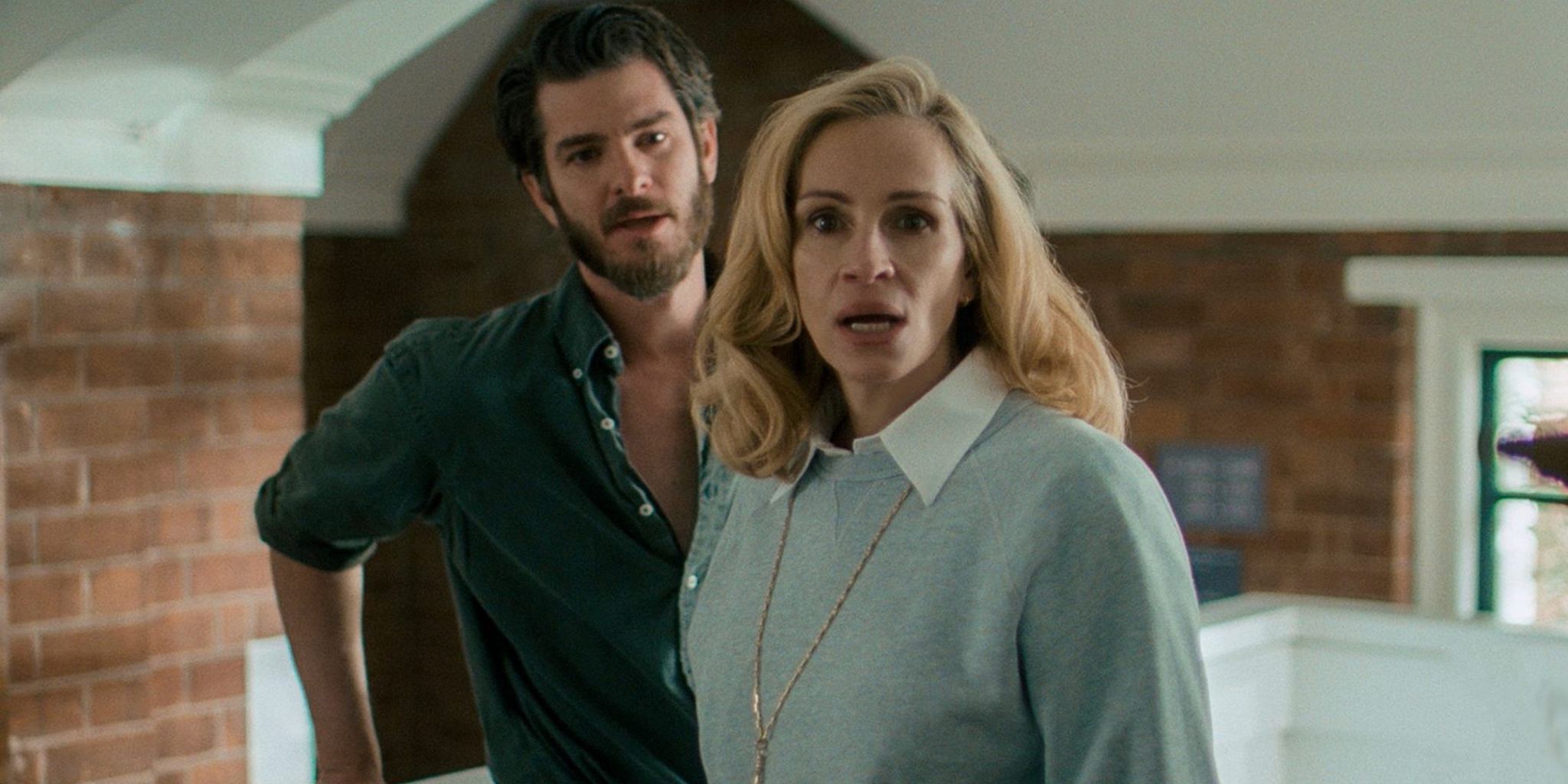
In her latest column for A Rabbit’s Foot, Haaniyah Awale Angus considers the legacy of Aaron Sorkin’s Facebook drama, and why, despite moments of redemption, After the Hunt fails to live up to premise.
Inspired by the book The Accidental Billionaires, Aaron Sorkin successfully immortalised the early days of Facebook through the 2010 biographical drama The Social Network. The film intercuts between different timelines, including one in 2003 depicting the initial founding of Facebook at Harvard, and another set years later, where Mark Zuckerberg (Jesse Eisenberg) is sued by his co-founder, Eduardo Saverin (Andrew Garfield). In what could have so easily been a film smoothing the ego of one of the world’s youngest billionaires, The Social Network opts to frame both Zuckerberg and the founding of Facebook not as the invention of a misunderstood genius or an inspirational rags-to-riches story, but one where a heartbroken man revolutionised the internet because he spitefully wanted to rate how hot his female classmates were.
Fifteen years on from the film’s initial release, The Social Network has remained one of the decade’s contemporary greats. This past summer, it was ranked number 10 and number 13 on The New York Times’ and Rolling Stone’s best movies of the 21st century lists respectively. Beyond the fact that it’s a superb movie with Sorkin’s introspective writing and David Fincher’s keen directorial eye so primed for detail and precision, the continued adoration and fascination with The Social Network, may also have something to do with the fact it served as an insight into one of the largest social media platforms at the time, paving the way to let those of us outside of Silicon Valley bear witness to the minds that have forever changed the way humanity communicates.
The film has also been an interesting to reflect on considering Facebook’s current reputation. In the 2010s, the website went from a place to keep up to date with your friends to one that has decimated the state of journalism through its lies about ‘pivot to video’ and where its users were unknowingly targets of political data harvesting that led to both Brexit and the election of Donald Trump in 2016. It’s clear that The Social Network has helped make sense of something we still find difficult to wrap our heads around: why the world has gone to utter shit, and why, along with it, do some of the most powerful people in the world continue to pour gasoline on the fire. Suffice to say, the film has aged incredibly well, to the point where there have been years of public clamouring for a sequel to explain Facebook’s influence in the 2020s. This is currently in production (directed and written by Sorkin) with Jeremy Strong set to star as Zuckerberg.
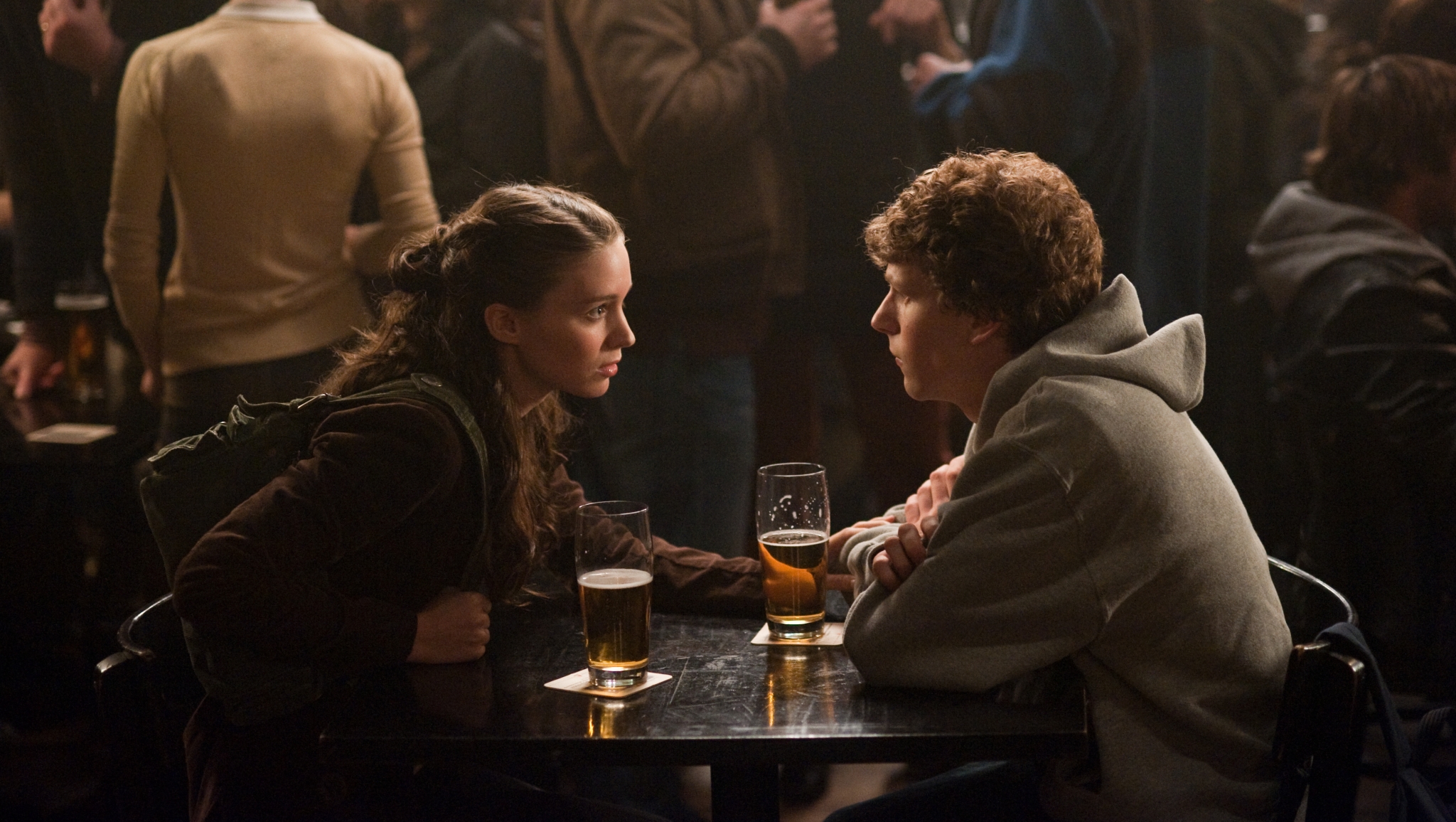
“After the Hunt isn’t about social media in the same way The Social Network isn’t about Facebook. On the surface, it’s about the company’s origins, but not really—it’s about class, ego, loyalty, friendship and betrayal.”
In the meantime, as we wait for Sorkin’s follow-up, I got to watch Luca Guadagnino’s After the Hunt last week, where I had a scary sense of deja vu upon realising that the two films share a strand of DNA, most obviously through Garfield’s performance, as Hank, a PhD professor accused of assaulting Maggie (Ayo Edebiri), a young philosophy student. At several moments, Garfield’s outbursts echoed the iconic scene in The Social Network where he unplugs Zuckerberg’s computer and screams at him, a monologue that has gone viral over the last five years, spawning remakes and parodies. Other similarities include setting, seeing that both films feature Ivy League institutions on the East Coast: Harvard for The Social Network and Yale for After the Hunt, along with their historical courtyards and buildings captured during autumnal days and winter nights. Notably, both films are scored by Nine Inch Nails band members Trent Reznor and Atticus Ross, with The Social Network being their first credited film score, shortly followed by their score on Fincher’s The Girl with the Dragon Tattoo (2011).
After the Hunt is far from a perfect film, but there are moments that make it worth watching, its sterile cleanliness when the film moves in and around the high pressure environment of Yale, juxtaposed with warmly lit rooms and jazz song selections that, when in combination with Ross and Reznor’s score, reminded me of a Sondheim’s Company, coming across as confused and unsure of its place in the world as the protagonists of the film itself. There are several moments where Guadagnino opts to focus on hands or close-range shots, shifting to a first-person perspective, placing you into heated conversations and uncomfortable dynamics. Julia Roberts, who plays Alma, the colleague of Hank and the teacher of Maggie, goes full throttle into her performance as a woman so wrapped up in her own dishonesty and trauma that she’s unable to see when history repeats itself right in front of her. Unfortunately, despite the positives, the film’s writing leaves a lot to be desired, considering it’s adding onto the recent overload of ‘this is the most important film for the times’, we’ve been inundated with this year from films such as Ari Aster’s Eddington, PTA’s One Battle After Another, and Danny Boyle’s 28 Years Later all to varying degrees of success.
After the Hunt isn’t about social media in the same way The Social Network isn’t about Facebook. On the surface, it’s about the company’s origins, but not really—it’s about class, ego, loyalty, friendship and betrayal. As Sorkin states for Time Magazine, “It’s about those kinds of things that were being written about 4,000 years ago. It struck me as a great big classic story. And those classic elements were being applied to something incredibly contemporary.” During a dinner party where a fellow grad student notes that Alma is a shoe in to get tenure instead of Hank due to her being a woman, Maggie rejects that notion in its entirety arguing that that the unnamed movements and progress of the 2010s that supported women were pushed as hollow falsehoods. I imagine that, After the Hunt’s centring of cultural debates about #MeToo and fourth wave feminism with a refusal to pinpoint specific parts of popular culture was an attempt to effectively embrace the same ethos.
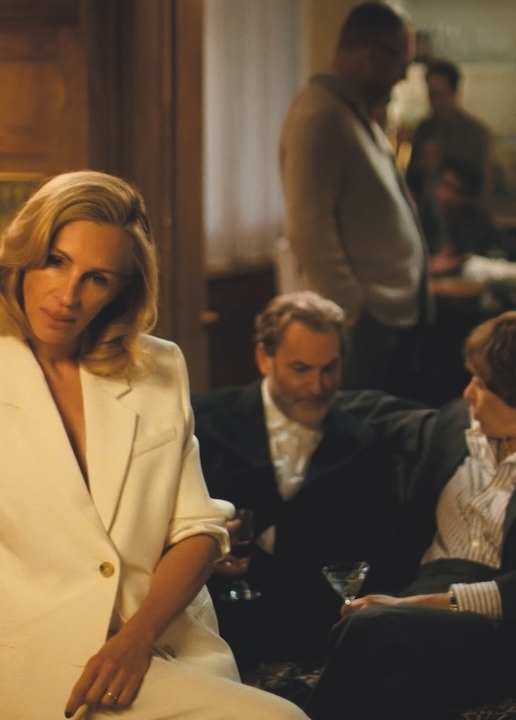
“After the Hunt meanders through half-thought-out attempts to regurgitate passé jokes about safe spaces from a generation that is numb to the bone with irony and brain rot…it felt like the filmic version of scrolling through a curated For You Page without an off button.”
Haaniyah Awale Angus
After the Hunt references vague cultural rifts that widened our generational gaps, siloed conversations about topics such as consent, sexual assault which, from my recollection as someone who turned 13 in 2011, often, if not always, took place on social media, sensitivity on university campuses, the ethics of student-teacher relationships and the gatekeeping of mediocrity. If you think that sounds like a lot of ground to cover, you’d be correct. The film’s runtime is approximately 139 minutes, and I can’t say it used that time effectively; instead, it meanders through half-thought-out attempts to regurgitate dated and passé jokes about safe spaces from a generation that, in reality, is numb to the bone with irony and brain rot. I noted to a friend after watching it at LFF that it felt like the filmic version of scrolling through a curated For You Page without an off button.
Coming out of After the Hunt what I found most interesting, despite my disagreement with the film’s ending—an unnecessary epilogue where five years later Maggie reunites with Alma to give her a piece of her mind in the most roundabout way possible, is the way it examines generational differences. The perception of victimhood and whether one should internalise their pain or excorise it, is a needed one. The Social Network opts to unearth the emotional ills and victim complex of men who have become some of the most powerful and influential people of our lifetimes. Zuckerberg has transformed from an awkward, nerdy teenager taking back ‘control’ from those deemed more popular and attractive than he was as a college kid to someone who has outwardly backed anti-DEI policies, supported the growing fascism of Donald Trump and aided in the hellfire that is misinformation online. What happens when individuals with singular-track minds, who are driven to defeat anyone who dares to go against them, receive unlimited financial resources? Does it help them process their perceived trauma, or does it simply aid in vengeance? Men like Elon Musk, Peter Thiel, Jack Dorsey, and others consider themselves a class above the rest of us. This illusory fabrication seems almost impossible to shatter because it’s a self-created construct designed to mask their inability to accept that not everyone is meant to be adored and that no matter how powerful they become, whatever searing feeling of insecurity they hold won’t vanish.
Obviously, in After the Hunt, Edebiri’s character is not Zuckerberg, but there’s an argument made that her privilege of being the child of billionaires places her at an unfair advantage compared to Alma and Hank. It’s an interesting dilemma, albeit one I doubt was rewritten to include the complexities of race and gender, seeing that the limited acknowledgement of race in particular feels like an afterthought, stopping short at quips about ‘young Black women’ not being supported and nothing more. Maggie is apparently a subpar student, to the point of plagiarising her dissertation, which is why Alma’s husband, Frederik (Michael Stuhlbarg), remains perplexed by his wife’s obsession with her. I wonder then, why this mediocrity is seen as so harmful. I’m not by any means arguing for plagiarism as someone who has struggled in grad school myself, but that doesn’t convince me of this narrative that this one particular girl represents everything wrong with young people or at the very least, everything wrong with how Gen X perceives young people.
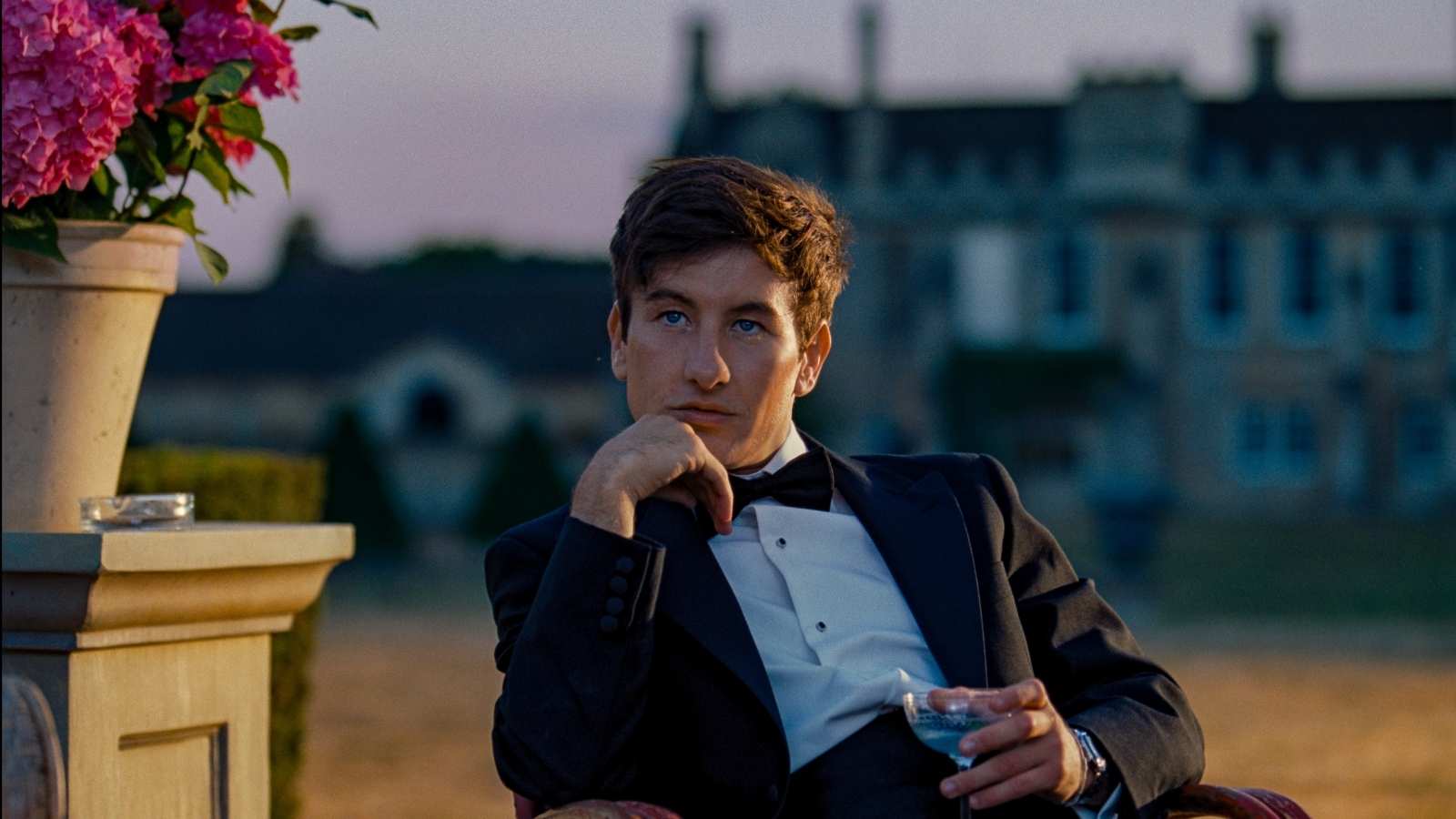
“I felt a similar way about Saltburn (2019), another film that lends itself to the on-campus drama despite half its runtime taking place on the Saltburn estate… Saltburn attempts to detangle a messy conjoinment of desire, privilege, and jealousy.”
Haaniyah Awale Angus
This may be an out-of-field comparison, but I felt a similar way about Saltburn (2019), another film that lends itself to the on-campus drama despite half its runtime taking place on the Saltburn estate. Saltburn attempts to detangle a messy conjoinment of desire, privilege, and jealousy. Higher education is a place of learning and growth, but it is also one of deep resentment and envy. Especially, when you’re convinced that you are uniquely suited to being better than others, that your work and legacy must be enshrouded in the halls of Harvard, Yale or Oxford. It’s a level of narcissism that I’ve encountered through my own time around Ivy League and Russell Group students, where you’re sat in disbelief at someone’s delusional assumption that their educational status genuinely makes them better than others. It’s no wonder then that it has the potential for such compelling and sticky storytelling in the right hands, where you’re unable to look away at the mess left on your screen and wonder in grotesque amazement at the discarded relationships mired in emotional turmoil. Except that much like After the Hunt, Saltburn is also hollow, an attempt to make a statement about a thing (class politics) rather than a coherent and thought-out story. A film that thinks more about how people will react to said film and less about whether or not it believes in its own messaging.
The epilogue at the end of After the Hunt is a key example of this notion. The film can’t trust that what we’ve sat through over the past two hours is enough to convince us that this is the surefire way of conversing about generational ills; instead, we sit through clunky dialogue about how Maggie just can’t believe Alma is still so stubborn and privileged, and Alma plays it off like Maggie is forever marred by her trauma despite the fact she has enough money to bury that pain. There’s a scene before this where, after a medical emergency, Alma is rushed to the hospital and wakes to see Frederik by her side, and it is there that she tells him for the first time in their marriage the truth of her childhood abuse, to which he comforts her, and they sit in silence. This remains my favourite part of the film because the beat allows the characters to process their emotions, while also giving the audience time to sit with what we’ve just witnessed, that through all the screaming and the crying and the blaming, there lie two people, perhaps not in love but being honest with each other, and that’s what we’re missing at this moment in time.
The end of The Social Network resonates with me in an identical way, particularly when Zuckerberg sits at his laptop, continuously pressing the friend request button on his ex-girlfriend’s Facebook page—the same girlfriend who dumped him, which initially sparked his vengeful quest. It’s quiet and contemplative, and frankly, a very human moment from a flawed person. When the dust settles, what remains for us when we lose our job opportunities or our legacy, and what is there to do but sit in quiet thought? Maybe that’s what we all need to be doing.





